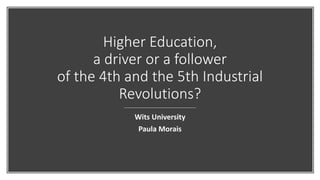Higher Education, a driver or a follower of the 4th and the 5th Industrial Revolutions?
- 1. Higher Education, a driver or a follower of the 4th and the 5th Industrial Revolutions? Wits University Paula Morais
- 2. Questions What does the 4th and 5th industrial revolutions entail for higher education? What kind of role will Higher Education Institutions play? Drivers of the transformations or followers? What kind of accreditation systems will be required? What type of organizational structures to support the change? Who will be the key stakeholders? The whole system? How can adaptive change be supported to engage with the transformations required?
- 3. January 2016: 4th Industrial Revolution ŌĆ£Augmented realityŌĆØ by Tom is licensed under CC BY 2.0 ŌĆ£Neil Harbisson cyborgist.jpgŌĆØ by Dan Wilton/The Red Bulletin is licensed under CC BY 2.0
- 4. January 2016: 4th Industrial Revolution ŌĆ£Up Town SpotŌĆØ by Boston Dynamics
- 5. January 2016: 4th Industrial Revolution Klaus Schwab Founder of the World Economic Forum ŌĆ£lines between the physical, digital, and biological spheresŌĆØ become indistinct, evolve at exponential pace, disrupting all industries in every country, leading to systemic transformations.
- 6. August 2016: 5th Industrial Revolution? ŌĆ£Sunshine PollutionŌĆØ by Daniel Lerps is licensed under CC BY-ND 2.0 ŌĆ£Misquote! Oh the Irony...ŌĆØ by Hanoian is licensed under CC BY-NC-ND 2.0
- 7. August 2016: 5th Industrial Revolution? ŌĆ£VoyageŌĆØ by Audionautix is licensed under CC BY 4.0
- 8. August 2016: 5th Industrial Revolution? The Anthropocene Working Group voted to consider ŌĆ£AnthropoceneŌĆØ as the new geological age. The 5th industrial revolution, with cleantech and renewable energies, has just started ŌĆ£Anthropocene-GreatAccelerationSocioEconomicTrends-1750-2010ŌĆØ by Bryanmackinnon is licensed under CC BY-SA 4.0
- 9. Industrial Revolutions end of 1700 1st Industrial Revolution 1900 2nd Industrial Revolution ŌĆō begin of 1900 1950 3rd Industrial Revolution ŌĆō begin of 1950 1980 4th Industrial Revolution ŌĆō Midst of 1980 (term is coined in 2016) 2016 5th Industrial Revolution ŌĆō AnthropoceneŌĆ”
- 12. What does the 4th and 5th industrial revolutions entail for higher education? Knowledge, research, attitudes, co-create - exponential and disruptive/ different mindsets
- 13. What does the 4th and 5th industrial revolutions entail for higher education? Knowledge, research, attitudes, co-create - exponential and disruptive/ different mindsets Ethics and philosophy ŌĆō artificial intelligence (AI), biotech, robotics, cleantech
- 14. What does the 4th and 5th industrial revolutions entail for higher education? Knowledge, research, attitudes, co- creators - exponential and disruptive/ different mindsets Ethics and philosophy ŌĆō artificial intelligence (AI), biotech, robotics, cleantech Engagement and interaction ŌĆō systems / key stakeholders/quadruple helix of innovation
- 15. What does the 4th and 5th industrial revolutions entail for higher education? Knowledge, research, attitudes, co-creators - exponential and disruptive/ different mindsets Ethics and philosophy ŌĆō artificial intelligence (AI), biotech, robotics, cleantech Engagement and interaction ŌĆō systems / key stakeholders/quadruple helix of innovation Validation of knowledge, attitudes ŌĆō accreditation systems for peer learning, certification industry led, AI, MOOCs, assessment
- 16. What does the 4th and 5th industrial revolutions entail for higher education? Knowledge, research, attitudes, co-creators - exponential and disruptive/ different mindsets Ethics and philosophy ŌĆō artificial intelligence (AI), biotech, robotics, cleantech Engagement and interaction ŌĆō systems / key stakeholders/quadruple helix of innovation Validation of knowledge, attitudes ŌĆō accreditation systems for peer learning, certification industry led, AI, MOOCs, assessment Formal and organizational structures ŌĆō global, regional, glocal, local; academic, research and administrative and what else?; systems, processes, policies, strategies
- 17. How can adaptive change be supported to engage with the transformations required? Further discussion on slack witsuni.slack.com
- 18. Thank you! ŌĆó pmorais66@gmail.com ŌĆó Twitter: @namorais ŌĆó Blog: https://theoerworld.wordpress.com/

















